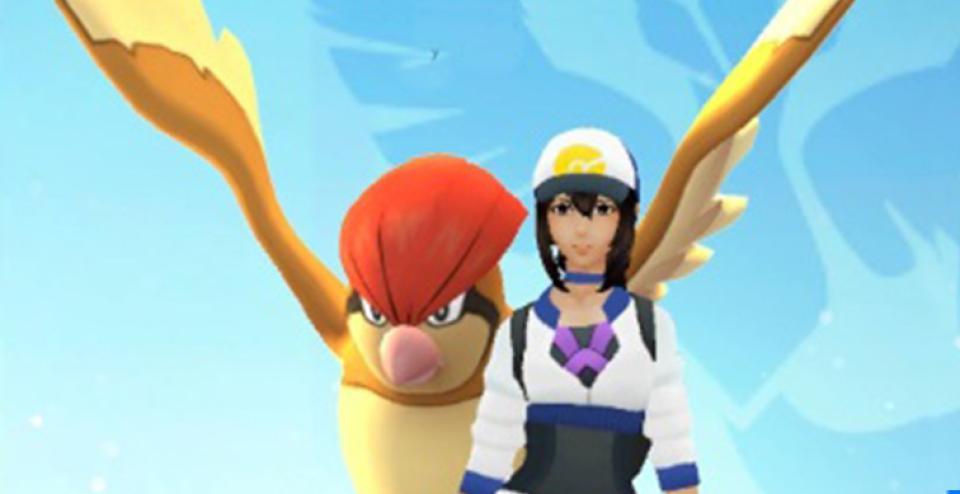
Image shared by author
This article is part of a series of GenderIT.org columns, and here we feature translations from Spanish. Evelin Heidel from Argentina will share her experiences in gender, technology, programming and access; and Angelica Contreras from Mexico will write about young women and their lives immersed in technology.
I am AkiConterR and my companion is a “Pidgeotto” who I call “Pid”. I belong to Team Mystic; I am on level 7 and I have 53 Pokémons (72, actually, but some of them I transferred). Together we roam through Aguascalientes to fulfil my aim of becoming a Pokémon master.
Pokémon the anime series arrived on Mexican television 20 years ago, on what was then “Canal 5” (Channel 5), and I grew up with Dragon Ball, the Knights of the Zodiac, and Sailor Moon, but this new proposal about capturing Pokémon “characters” (which had originally been part of a videogame, as I had learned much later) struck me as remarkably interesting. I remember too that at school they did not like us to mention the subject because Pokémon was “satanic”!
Now, 20 years later, we are surprised to find as adults we have strong memories of the Pokémon mugs, cards and stickers we collected during our childhood. But can this virtual reality game be played by women? When it arrived in Latin America, after starting up in other countries, Pokémon Go had a large number of users, and I thought that all the women of my generation played it.
In actual fact, even with the passage of the years and the closing of some gender gaps, the images of women in videogames remain sexualised. In others, there is not even a single female image, other players harass you and everything is centred on the male characters. So why do we play them?
Women who play
“Ever since I was little I liked Pokémon, and what I like about it is that it is a game where you do not just sit and play with your cellphone, you go out, you walk around, you have to be on the move.” Elena, Mexico
Videogames continue to be applications with an overwhelmingly male target audience. This might explain why many women remember the anime series and the female characters: Misty, Marina, Jessie, Delia Ketchum, May, Nurse Joy. Being part of the adventure was one of our dreams when we were girls.
Some current women players have features in common: a nostalgia for their childhood; but also they grew up at home watching the series, under the influence of older brothers, friends or cousins. The positive fact is that they had access to videogames at home.
“I remember my childhood” Jennifer, Mexico
Something I found strange was that many women told me they started to play Pokémon Go encouraged by their boyfriend or partner, whom they heard talking about the game or saw what they did, and they were curious and got them to download the game.
“It is an interesting game because it is linked to places, and you have to get out of the house, meet other people and walk about the city” Brunna, Brazil
It must also be stressed that there are young mothers who play Pokémon Go for the sake of their small children. “I give him the cellphone to play with it, that’s how I learned to catch Pokémons,” they say, indicating that without being active players they allow their children to participate fully, and so indirectly they become part of the game.
Women who do not play
“My ambition as a girl was to collect CDs, fill up my Barbie house with furniture and dance like the Spice Girls” Tere, Peru
When I thought that the game was all the rage and that absolutely all my women friends were players like myself, I realised this was not the case.
An interesting feature common to women who do not play Pokémon Go is that they do not see the point in “catching Pokémons”, because “what do you do with them afterwards?” Clearly they see it as a waste of time to walk endlessly searching for something – “but exactly what are we looking for?” – and an unnecessary outlay of money due to the expense of internet connections.
Women are delighted to see the return of an anime series that they used to watch as girls, but they no longer see the point. “My games were the old-fashioned kind,” some of them say. “Videogames in the home were (and probably still are) a luxury few could afford, and my entertainment options were playing with dolls and dolls’ houses. Naturally, if there was a videogame in the house it was for the boys, or do you expect a boy to play with dolls?”
“Videogames in the home were (and probably still are) a luxury few could afford, and my entertainment options were playing with dolls and dolls’ houses. Naturally, if there was a videogame in the house it was for the boys, or do you expect a boy to play with dolls?
Gender stereotypes are still present in videogames, directly or indirectly. We keep referring to them as “games for boys”, and many women confirm this by saying these games are not for them, when they are asked.
This is a clear example that we do not believe that action, technology or participating in online activities are for women, and again we construct the gap between the public and the private, with digital space becoming a part of the public area.
“I prefer to spend the time I would spend playing the game establishing dynamic relations with family and friends,” Maria, Colombia
My privacy comes first
“I am very concerned about the idea of lending one’s vision of life to someone or something else”, says Sandra from Colombia. Something I never thought about was my privacy, and where all the information arising from the many kilometres I walked in order to catch Pokémons would end up.
It is incredible to find cases of women who fear for their digital security, and are concerned about where their information will go, to which server and how it will be used. This is not paranoia. These days, any camera can be used for spying and it is right to be cautious, but contrary to general belief, we can see that women users are thinking and reflecting on how they use and operate on the internet.
“I like videogames, I just don’t like Pokémon Go because of the vulnerability of its data collection and geolocation in real time” Nat, Guatemala
More videogames for women based on real women
I have never played a videogame on a console. There were only two videogame consoles in our house, an Atari belonging to my father which has since been kept as a relic, and a console in my only brother’s bedroom, to which I did not have access. The fact that the console was in the “boy’s room” established that this game was for boys.
With Pokémon Go, from the start, I found it remarkable that one could choose a female or male avatar, and clothe it without plunging necklines or high heels, excessive jewellery or any ornamentation. We have become accustomed to videogames presenting sexualised images of women in high heels, miniskirts and plunging necklines. At times I have asked myself “Could she really run, climb, jump and fight with high heels and such tight pants?” The avatar presents the stereotype of the slender woman who exercises and has an enviable physique. It is a step forward to find that the image of the avatar in this videogame is not sexualised, as has so often been the case.

Screengrab, courtesy of author
Will videogames one day be based on real women’s bodies? How can women identify with something that does not represent them but only the ideas of a few? The presence of a woman in videogames is apparently more ornamental and aesthetic than to perform a leading role. In the case of Pokémon Go, two out of the three teams where players can register are headed by women (Mystic and Valor).
“The girl’s image is very definite, slender and curvaceous” Martha, Mexico
None of my videogame partners ever mentioned being victims of any kind of violence or harassment in this videogame. This is probably due to there being no interaction with other players, and no exchange of messages or dialogue between them. Neither is there any control to authorise a player to compete in a gymnasium or enter a group, or not.
What is certain is that we cannot put all videogames on an individual footing in order to ensure that women players do not suffer harassment.
“Harassment is not the problem. What I have to be careful of is the dangers of my city at night” Mariel, Brazil
I still believe that Pokémon Go is an incredible opportunity to bring young women together to discover videogames for the first time, and an example of how women can be the subjects of our own stories as we construct adventures in a virtual reality world, with our own steps (literally our own steps). Perhaps in one of these worlds we may one day create our own Pallet Town where inclusion and non-violence are the standard norm.
- 4152 views






Add new comment